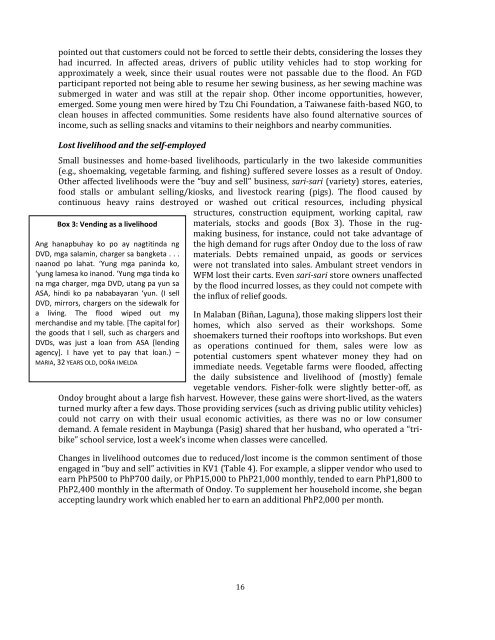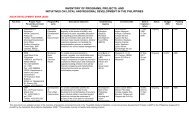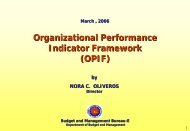rapid assessment of the social impacts of - Philippines Development ...
rapid assessment of the social impacts of - Philippines Development ...
rapid assessment of the social impacts of - Philippines Development ...
Create successful ePaper yourself
Turn your PDF publications into a flip-book with our unique Google optimized e-Paper software.
pointed out that customers could not be forced to settle <strong>the</strong>ir debts, considering <strong>the</strong> losses <strong>the</strong>y<br />
had incurred. In affected areas, drivers <strong>of</strong> public utility vehicles had to stop working for<br />
approximately a week, since <strong>the</strong>ir usual routes were not passable due to <strong>the</strong> flood. An FGD<br />
participant reported not being able to resume her sewing business, as her sewing machine was<br />
submerged in water and was still at <strong>the</strong> repair shop. O<strong>the</strong>r income opportunities, however,<br />
emerged. Some young men were hired by Tzu Chi Foundation, a Taiwanese faith-based NGO, to<br />
clean houses in affected communities. Some residents have also found alternative sources <strong>of</strong><br />
income, such as selling snacks and vitamins to <strong>the</strong>ir neighbors and nearby communities.<br />
Lost livelihood and <strong>the</strong> self-employed<br />
Small businesses and home-based livelihoods, particularly in <strong>the</strong> two lakeside communities<br />
(e.g., shoemaking, vegetable farming, and fishing) suffered severe losses as a result <strong>of</strong> Ondoy.<br />
O<strong>the</strong>r affected livelihoods were <strong>the</strong> “buy and sell” business, sari-sari (variety) stores, eateries,<br />
food stalls or ambulant selling/kiosks, and livestock rearing (pigs). The flood caused by<br />
continuous heavy rains destroyed or washed out critical resources, including physical<br />
Box 3: Vending as a livelihood<br />
Ang hanapbuhay ko po ay nagtitinda ng<br />
DVD, mga salamin, charger sa bangketa . . .<br />
naanod po lahat. ‘Yung mga paninda ko,<br />
‘yung lamesa ko inanod. ‘Yung mga tinda ko<br />
na mga charger, mga DVD, utang pa yun sa<br />
ASA, hindi ko pa nababayaran ‘yun. (I sell<br />
DVD, mirrors, chargers on <strong>the</strong> sidewalk for<br />
a living. The flood wiped out my<br />
merchandise and my table. [The capital for]<br />
<strong>the</strong> goods that I sell, such as chargers and<br />
DVDs, was just a loan from ASA [lending<br />
agency]. I have yet to pay that loan.) –<br />
MARIA, 32 YEARS OLD, DOÑA IMELDA<br />
structures, construction equipment, working capital, raw<br />
materials, stocks and goods (Box 3). Those in <strong>the</strong> rugmaking<br />
business, for instance, could not take advantage <strong>of</strong><br />
<strong>the</strong> high demand for rugs after Ondoy due to <strong>the</strong> loss <strong>of</strong> raw<br />
materials. Debts remained unpaid, as goods or services<br />
were not translated into sales. Ambulant street vendors in<br />
WFM lost <strong>the</strong>ir carts. Even sari-sari store owners unaffected<br />
by <strong>the</strong> flood incurred losses, as <strong>the</strong>y could not compete with<br />
<strong>the</strong> influx <strong>of</strong> relief goods.<br />
In Malaban (Biñan, Laguna), those making slippers lost <strong>the</strong>ir<br />
homes, which also served as <strong>the</strong>ir workshops. Some<br />
shoemakers turned <strong>the</strong>ir ro<strong>of</strong>tops into workshops. But even<br />
as operations continued for <strong>the</strong>m, sales were low as<br />
potential customers spent whatever money <strong>the</strong>y had on<br />
immediate needs. Vegetable farms were flooded, affecting<br />
<strong>the</strong> daily subsistence and livelihood <strong>of</strong> (mostly) female<br />
vegetable vendors. Fisher-folk were slightly better-<strong>of</strong>f, as<br />
Ondoy brought about a large fish harvest. However, <strong>the</strong>se gains were short-lived, as <strong>the</strong> waters<br />
turned murky after a few days. Those providing services (such as driving public utility vehicles)<br />
could not carry on with <strong>the</strong>ir usual economic activities, as <strong>the</strong>re was no or low consumer<br />
demand. A female resident in Maybunga (Pasig) shared that her husband, who operated a “tribike”<br />
school service, lost a week’s income when classes were cancelled.<br />
Changes in livelihood outcomes due to reduced/lost income is <strong>the</strong> common sentiment <strong>of</strong> those<br />
engaged in “buy and sell” activities in KV1 (Table 4). For example, a slipper vendor who used to<br />
earn PhP500 to PhP700 daily, or PhP15,000 to PhP21,000 monthly, tended to earn PhP1,800 to<br />
PhP2,400 monthly in <strong>the</strong> aftermath <strong>of</strong> Ondoy. To supplement her household income, she began<br />
accepting laundry work which enabled her to earn an additional PhP2,000 per month.<br />
16




